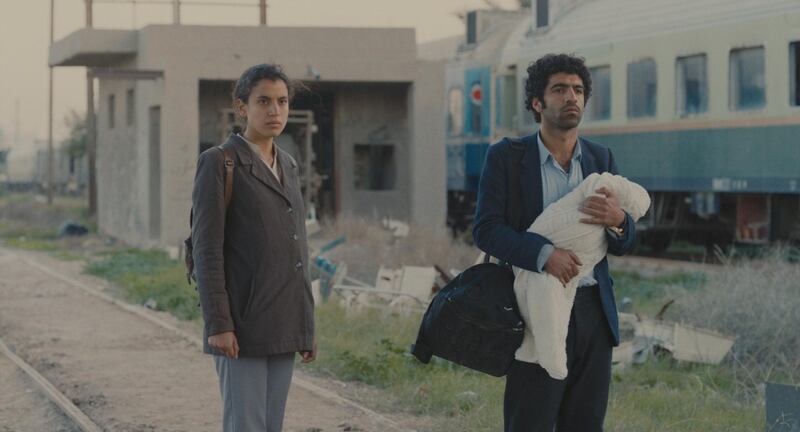It was while making Son of Babylon, which had its world premiere at the Abu Dhabi Film Festival in 2009, that Iraqi filmmaker Mohamed Al-Daradji first had the idea for his latest film, The Journey, this year's Iraqi nomination for Best Foreign Language Oscar.
Speaking from his base in Baghdad, Al-Daradji explains the origins of The Journey. "In 2008, I read a newspaper article about a young female suicide bomber, who came to a Baghdad police station and said she had a bomb that she didn't want to explode. The police stripped her and tied her to the railings outside to humiliate her. I saw this picture of her and it shocked me because I was in the middle of shooting Son of Babylon, a film about a female victim of war, and I hadn't even thought about a woman being the perpetrator, a killer."
He started to think about how he would make a film about a suicide bomber. It’s a sensitive subject anywhere in the world, but more so in a country where such attacks are a depressingly common occurrence. Iraq experiences more terrorist attacks, including suicide bombings, than any other country in the world.
So it's understandable that when Al-Daradji first thought about the project, he saw it as an opportunity to condemn Al Qaeda for making such atrocities a daily occurrence. "They destroyed my country and they destroyed my people," he says.
His attitude changed in 2012. After a year and a half of refusals, the director was given permission by the Minister of Justice to talk to female prisoners who had been convicted of attempting suicide attacks.
"The director of the prison gave me four file cases to look at," Al-Daradji recalls. "One of the girls was 19, big eyes, brown, beautiful – and she was so self-confident. I thought this woman could be at university and not in prison. I asked myself how did this woman end up on this path. I started to rethink the main character."
The director then changed the script. “I just try to understand them, not hate them,” he explains. “Why does she want to do this? What drove her to do this? I wanted to get a human side, what goes through their mind.”
The Journey takes place on the first day of Eid Al Adha in 2006, at a time when Baghdad is celebrating the reopening of the city's train station. There are characters from all walks of Iraqi life in the station on that day: extremists, secular men, young orphans, businessmen, musicians and American soldiers.
The wide-eyed Sara (Zahraa Ghandour) arrives with the intention to destroy the festivities. In the station is a flirtatious salesman (Ameer Jabarah) who approaches Sara, and she takes him hostage. They then, together, have to confront their own mortality and actions.
The film has a striking, circular structure, both in the way the characters move around the train station, where all the action takes place, and also in the way the film folds in on itself in a surprising way.
The inspiration for how the story would be told came from two sources, Al-Daradji says. "When I was making my film Dreams in 2004, I was kidnapped by Al Qaeda and when they did this I collapsed. Events from my life began to flash before my eyes."
Al-Daradji and his fellow crew managed to escape from their captors, when police sirens distracted their kidnappers. The other source for the film's narrative device came from the Quran. "I tried to get inspiration from the Quran," he says, "and I was lucky as I came across a Surah, which I use twice in the film, that when you are about to die, God will give you the power to see the unseen."
______________________
Read more:
Matthew Heineman’s new biopic on Marie Colvin is ‘an homage to journalism’
Review: 5 Weddings is a film that could have been so much better
'I would love to play a dark character': Chitrangda Singh on #MeToo and roles for women in Bollywood
______________________
The Journey is the director's fourth fiction film. He has also made two documentaries, War, Love, God and Madness (2008), about the making of Dreams, and In My Mother's Arms (2011), which centres on an orphanage in Baghdad's most dangerous district. The Journey is the third time he has been selected as the Iraqi foreign language Oscar nomination, in addition to Dreams (2006) and Son of Babylon (2009). His other feature film, In The Sands of Babylon, won the 2013 Abu Dhabi Film Festival's narrative prize.
There are several themes and methods that have emerged in his oeuvre, such as mostly working with non-professional actors, and depicting characters on a voyage searching and deep psychological trauma.
“Maybe that’s something to do with me, because I left Iraq when I was young and am always on the move,” he says of the journey theme. “In 1995, I went to Holland, and then I went to the UK, so maybe I’m a gipsy. My next film is the same and the one after that – there is always the road and something to search for.”
For the past four years, he has mostly been based in Baghdad. "There are 38 million people living in this country and sometimes I think we are all suffering from post-traumatic stress disorder," he says. "We've not had a real moment of peace in Iraq since 1968. We are a generation of war children and have been damaged by it. What's really affecting us is that there's no release for our anger and frustration, there's been no reconciliation and there is no proper response from society to reconcile with this past."
The Journey is showing in cinemas across the UAE from November 21






